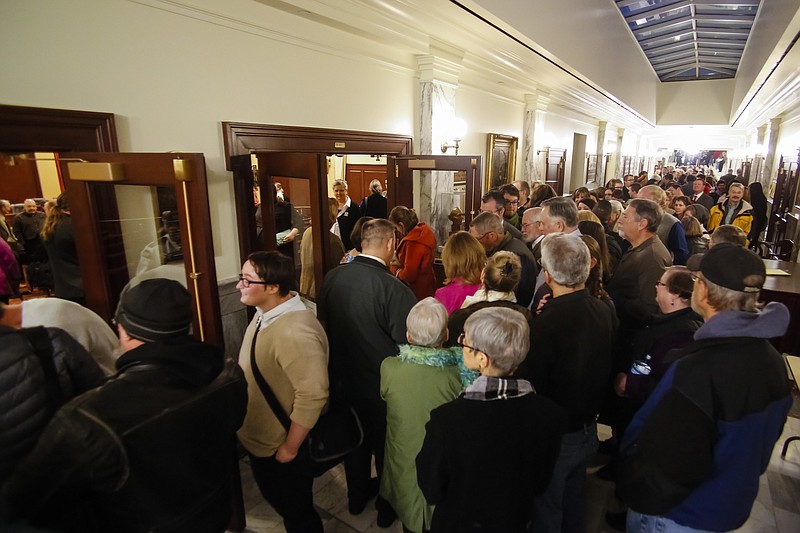BOISE, Idaho (AP) - A new bill that would create protections for gay and lesbian people in Idaho attracted explosive testimony Monday, where supporters of religious freedom went toe-to-toe against hundreds of advocates who had waited nearly a decade to speak for the legislation.
The legislation has been denied a public hearing for nine consecutive years by the Republican-controlled Idaho Statehouse. Yet advocates have refused to be ignored. The movement peaked in 2014 after protesters disrupted the Idaho Statehouse with a series of civil-disobedience demonstrations -leading to more than 190 arrests throughout the session and forcing the hand of conservative legislative leaders, who conceded the time for a hearing had finally come.
"My son now presents as my daughter, and I can't bear the thought of my precious child being treated unfairly by anyone simply for being herself," said Diane Terhune of Meridian, while testifying in front of the House State Affairs Committee. "For those of you who think (lesbian and gay) individuals don't need to be protected as a group because they choose their lifestyles, let me tell you that no one chooses this life. It is one of hardship."
Terhune and other gay rights supporters not only face opposition among the state's staunchly conservative legislators but also from Idaho's deeply religious population. Some at the hearing testified on Monday that they fear the bill, commonly known as "Add the Words," will infringe on their rights as individuals and business owners.
"Don't make laws that protect (against) laws against nature and sexual deviant acts," said Paul Thompson of Twin Falls. "Regardless of sexual orientation, it is a law that makes a mockery of all that is created and to our creator."
State Rep. John McCrostie of Boise, currently Idaho's only openly gay state lawmaker, responded that he, too, was a Christian and asked if Thompson's beliefs were greater than his own.
"I respect an individual's desire to want to live out their lives as they feel compelled to do so," Thompson said. "But I owe myself authority to the written word of God."
According to the bill, the words "sexual orientation" and "gender identity" would be included in the state's Human Rights Act, which already bans discrimination based on race, sex, color, religion and national origin in situations like housing or employment.
While gay rights advocates celebrated the recent legalization of same-sex marriage not only in Idaho but also across the majority of the nation, they have repeated that the fight is not over until states pass anti-discrimination laws.
As of Monday morning, nearly 500 people had signed up to testify in front of the House State Affairs Committee.
"I want to be valued as a human being based on the person that I am, the person that my mother raised me to be," said Julie Stratton of Post Falls. "Please include my wife and me as fully equal citizens of this state and help us to be proud of living here."
Stratton's testimony -along with many other personal stories of discrimination from lesbian, gay, bisexual and transgendered Idahoans- was countered by the many concerns coming from pastors, small business owners and national conservative organizations afraid the bill would infringe on free speech and religious freedoms.
Arizona-based United Families International President Laura Bunker cited cases in other states where businesses were sued for declining to serve to same-sex couples getting married.
"In the end these non-discrimination laws are not fair to all. Someone is ultimately discriminated against," Bunker said. "Why would Utah, or Idaho, sorry, want to put that kind of wedge between its citizens?"
Currently, 19 states have passed anti-discrimination laws that include sexual-orientation and gender-identity protections. Three states have passed laws protecting just sexual orientation.
Meanwhile in Idaho, 10 cities have bypassed the state and approved their own anti-discrimination laws.
"I'm somewhat offended that this bill has been introduced and is seriously being debated," said Doyle Beck of Idaho Falls. "It implies that Idahoans are nasty people and that we discriminate against our neighbors unless the government somehow intervenes and comes in to straighten us out. I'm not saying that discrimination doesn't exist, but I am saying that it's very minimal."
Beck added that he felt he had been discriminated while growing up because he had hair down to his shoulders, but he didn't feel the need to sue because of it.
Republican state Rep. Tom Loertscher of Iona says the House State Affairs Committee will reconvene at 5 p.m. to listen to more testimony.
